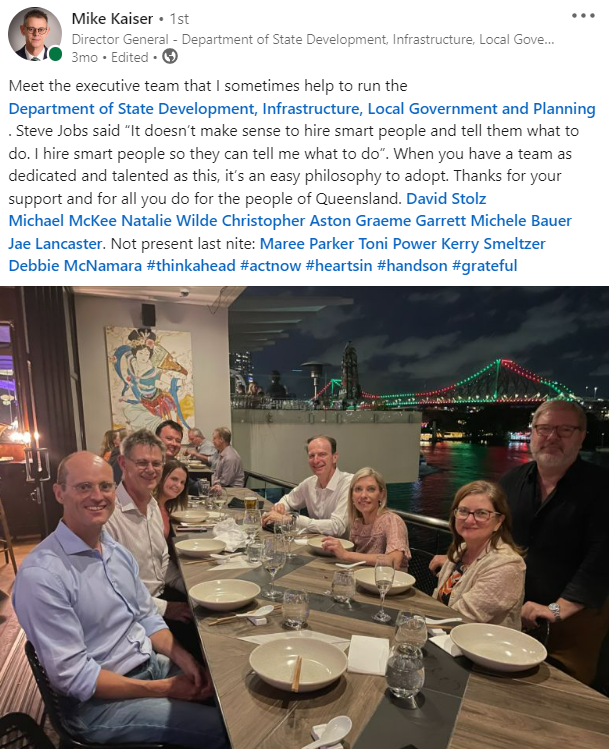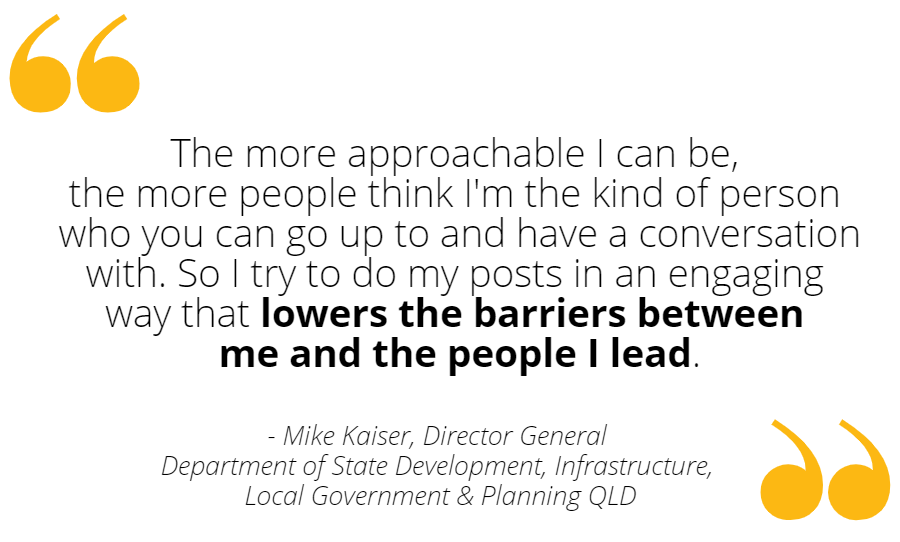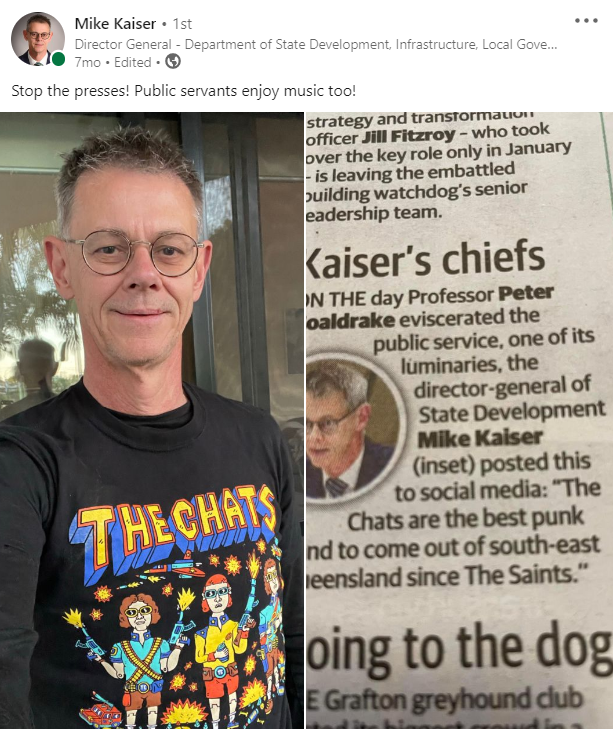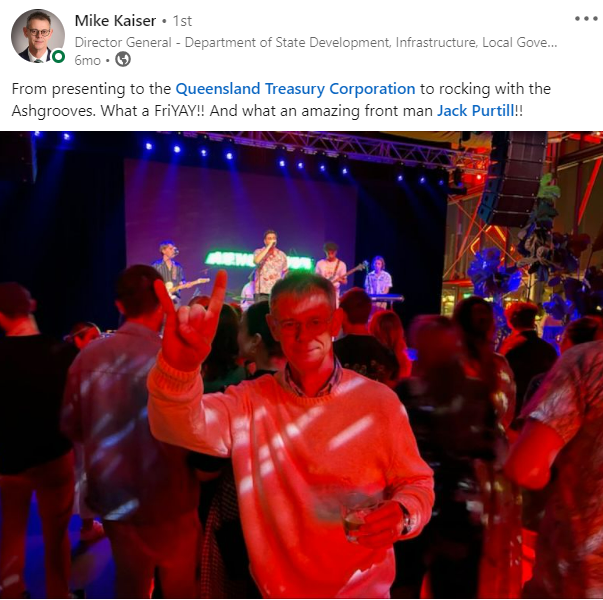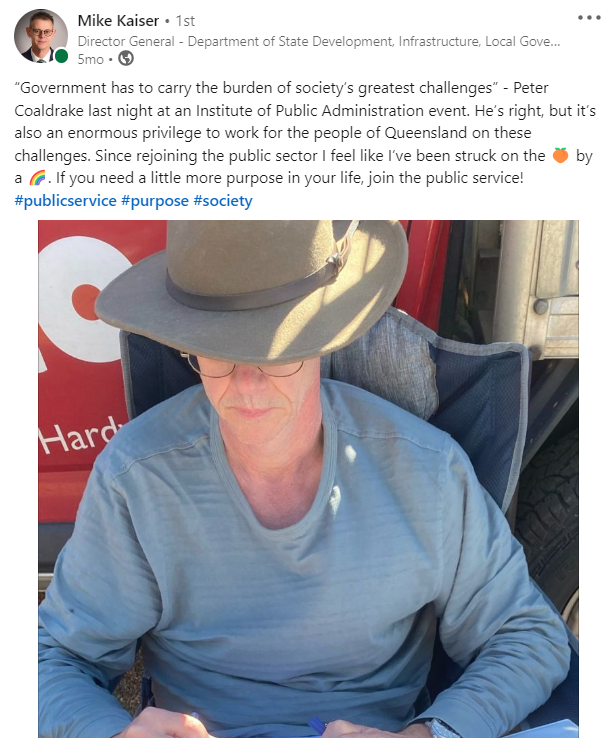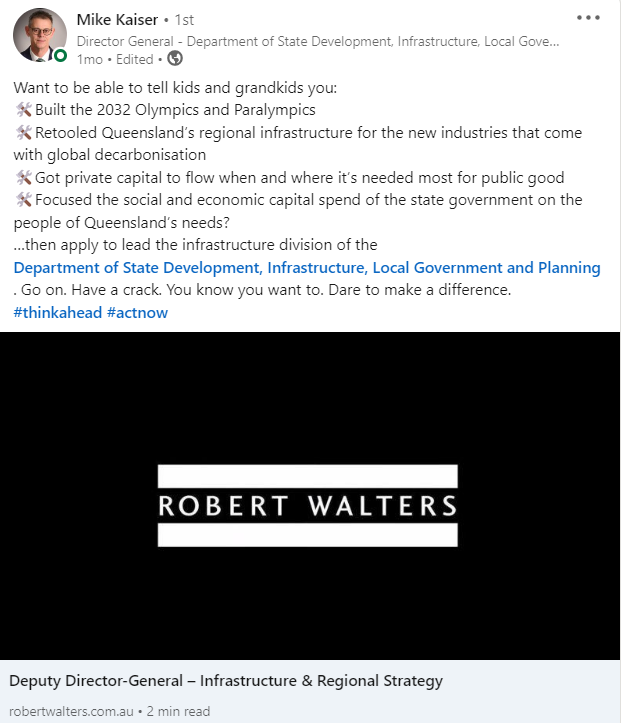In this episode, we’re exploring a question for leaders: Is it risky to be yourself online? Because I know so many today find it uncomfortable turning up online and just being themselves.
I’ve enlisted the help of someone I feel brings his authentic self to every social media interaction he makes, to learn what the pros and cons are of this sort of authentic leadership online. He’s currently Director General of a Queensland State Government Department, and perhaps the only senior bureaucrat I know who manages to balance posts about his favourite rock bands and sausage factories, with updates on state projects and how wonderful his team is at getting on with the job.
Mike Kaiser, it was an honour to have you on the Your Digital Reputation podcast. Here’s a snapshot of our chat – I hope you find it as insightful as I did.
WHY SPEND SO MUCH TIME TALKING ABOUT YOUR TEAM ONLINE?
Roger Christie: Mike, you spend so much time talking about the great work that your team are doing, tagging them in posts, celebrating them in comments. Why is that?
Mike Kaiser: It’s tough being a public servant. You don’t get a lot of thanks from people. You don’t get a lot of appreciation. You find yourself criticised by the media a lot, and of course, as a public servant, you have no recourse at all. It’s not as though you can defend yourself all that successfully, publicly either without crossing some lines.
So I spend a lot of time internally in the department thanking people for the great work they do for the people of Queensland. And I think it adds something to do that in a more public forum. It adds in a sense to the value of the appreciation.
Roger Christie: It’s such a simple thing, isn’t it? And yet, particularly when I talk to leaders, they underestimate the impact of those words; those simple words and simple actions. If you’re going to say it privately, say it publicly and increase the impact of that sort of message.
These things might seem like menial or understated tasks but they have a huge impact when they’re coming from someone who’s sitting much further up the chain recognising and validating your efforts.
Mike Kaiser: What I do online is really just an extension of what I do internally within the department. So thanking people falls into that category for me. I try to do it internally and what I do on social media is an extension of that.
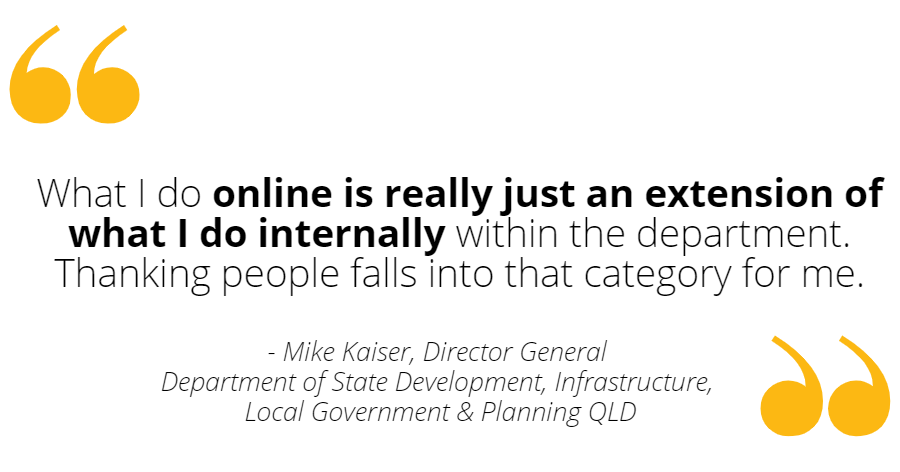
WHERE DO THE DIFFICULTIES LIE FOR LEADERS ONLINE?
Roger Christie: I had a conversation on this podcast with Matt Jones at Four Pillars Gin around the idea of people thinking they could use the digital environment to create a different version of themselves. When it comes to social media – the things people post and the profiles they create – there’s this perception of ‘astroturfing’ to use an industry term; creating a fake reality.
But when it comes to social media, I actually think it’s the opposite. I think that digital is actually holding up an accountability mirror to a lot of leaders and saying, ‘If you’re not this offline, you shouldn’t be this online. And if you’re not this online, you shouldn’t be this offline’. Digital is forcing leaders to be consistent, both on and offline. You should be the same version of yourself in all domains.
Where do you think the difficulty lies for others who might find that challenging?
Mike Kaiser: One mistake people frequently make is to delegate the task to someone else. If you ask your comms team or the marketing department to do this work for you, then you’re not going to get a projection of you, your style and your values into the social media environment. You’re simply not.
I write all my own posts. I respond to all my comments. I have actually tried it the other way a long time ago and it just grates. I don’t find it natural not to do that work myself.
I think if you start from the simple proposition that I’m going to engage in this activity personally and invest the 15 minutes a day that it takes, that’s a great starting point. You’re far more likely to come across authentically and to get that symmetry between what you’re like in person, what you’re like within your organisation as a leader, and what you’re like online.
Roge Christie: I agree – and what I’d add is you can’t manufacture context; your interactions with a larger audience, individual people, posts, comments, reactions, direct messages, private messages – whatever it looks like. There’s no way that you can try and pretend to be ‘Mike Kaiser’ if you are not Mike Kaiser. And I think that, therefore, the simplest and the best performing way to do that is to just be yourself.
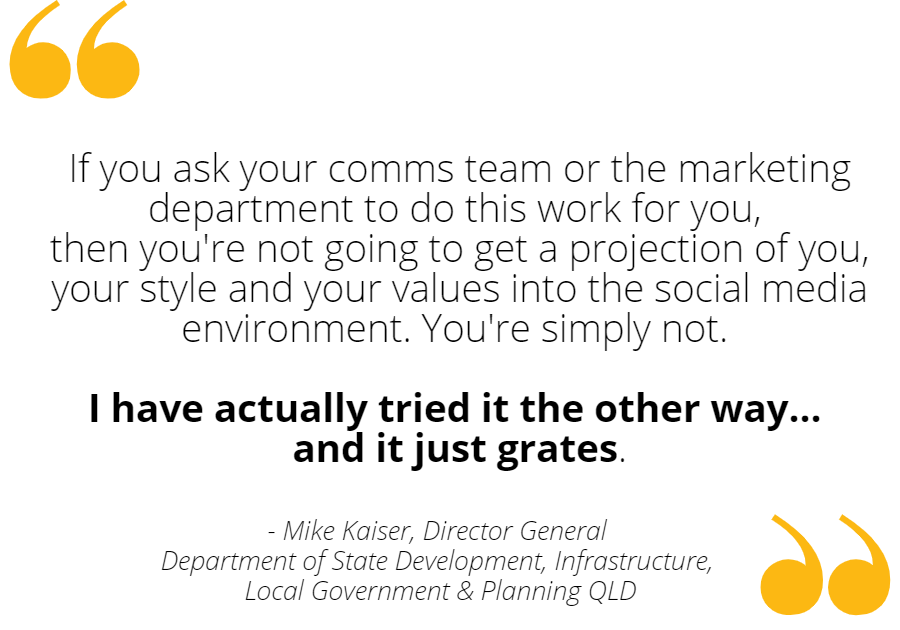
HOW DO YOU FIND THE TIME?
Roge Christie: I’m sure there are people who are thinking, ‘Mike, that’s all well and good, but where do you get the time?’ You mentioned 15 minutes a day. How do you make time in your day and why do you make time?
Mike Kaiser: I’m a public transport commuter and I’m a senior public servant so there’s not a lot of work that I can do on the bus. A lot of what I deal with is confidential. It’s not appropriate to start having conversations over the phone or to start reading confidential cabinet material on the bus.
So I can either read a novel or I can pull the phone out and do a bit of work on LinkedIn. Which, by the way, is my only social media platform. I admit, I glance at it a few times during the day, and add a comment here or there, but it wouldn’t extend to more than 20 minutes a day. As a public transport commuter, it’s an easy thing to do.
I often joke with people that I get so much positive feedback about what I do online – the fact that I’m doing this podcast with you is, in a sense, validation of that – and so little feedback about the other work that I do for the rest of the day. I sometimes jokingly say, ‘I wonder if I should just spend all of my time online, because that’s what people seem to appreciate?!’
Roger Christie: I’m sure not, but it might be the most visible work that you are doing, which again is a good reason to look at this digital environment with a bit more consideration for those who have been ignoring it up to this point.
GOVERNANCE: IS THERE A 'MIKE FILTER' OR A 'MIKE SOCIAL MEDIA POLICY'?
Roger Christie: I know you’ve talked about things that you can’t discuss publicly from a government perspective. But in the context of your own comments, your own ideas and the things that you do share online, how much governance is involved? I appreciate you write all your own content and do all your own responding, so is there a ‘Mike filter’ or a ‘Mike social media policy’? How do you know where to or where not to go in terms of what you do and say online?
Mike Kaiser: I do get a lot of feedback and a lot of praise for the openness of what I do on LinkedIn. But what people might not be aware of is that there is a line. I’m extremely conscious of that line and I try not to cross it.
One of the obvious places is around politics. It’s a hard judgment to make around what is legitimate commentary around government policy, government achievements, government implementation, the work of the department vs political comment, which is more the point of view of the politician. I work with the Deputy Premier of Queensland, so that’s the line.
There’s obviously a good taste and a bad taste line too. I’m guilty of maybe crossing that on occasions, but I’m conscious of it and I try to stay on the right side of it. It’s my own personal account. It’s not a department account but I treat it as a work account effectively. So yes, there is in a sense an ‘unofficial’ governance or policy approach rattling around in my head as I post.
WHY DO YOU MAKE TIME?
Roger Christie: You’ve obviously spent – and continue to spend – time thinking about things when you go to post or you go to comment. You’ve obviously made a conscious decision to think about why you’re turning up online, why do things and what the implications of things could be.
Am I right to assume that the time that you’ve spent there is because you see value in spending time online? And therefore it’s worth taking the time to think about what is the strategy here? Even as you were saying before, 15 to 20 minutes a day, you still want to make sure that’s worth your time.
Mike Kaiser: I’d like to think it’s purposeful. It’s about thanking people publicly or it’s about expressing a view on some of the work that the department does in a sort of an educative way for the public. I do a lot of posts around the role of government because I personally am desperately concerned about the government’s ability within society to go toe to toe with the private sector.
We all have our role to play, but society would be a much worse place if we didn’t have a very capable government system. I’m not talking about individual governments or political parties, but a government system being able to regulate society and work with the private sector for great outcomes.
I hold strong views about that and I like to promote those views because I think public servants around the Western world are just a bit downtrodden. Having a leader within the public service who is prepared to go out there and defend the role of government in society is something that I like to do. It’s something that I think is absolutely necessary in order to kind of lift the spirits and ambitions of the people who work in the public sector. And the fact that I’m willing to do it publicly, I think helps rally people.
And you mentioned the musical taste stuff. I always try to do my posts in a way which is a bit interesting and which always gives something away about me. One of the biggest problems in leading organisations – and it happens in the public sector too – is that it’s hard to get people to bring you bad news as well as the good. And so the more approachable I can be [online], the more people think I’m the kind of person who you can go up to and have a conversation with. And so I try to do my posts in an engaging way that lowers the barriers between me and the people I lead.
Roger Christie: I love this idea of proximity and keep talking to people about the need to reduce proximity to audiences. There’s that classic cliché about leaders in their ivory tower only coming out when they’ve got something to say, and not wanting to listen. I think that social media provides a wonderful opportunity for leaders to role model behaviours, but also to get closer to those audiences – to listen, to learn and to participate by reducing that distance, increasing trust.
I think that’s one of the great missed opportunities around social media – how to use this environment to show people that ‘I am human’, that ‘I am approachable’. That ‘We can talk’. That ‘You can share things with me’. And I imagine with that comes also a degree of sharing your own shortcomings and things that perhaps haven’t gone as well, rather than that hero complex of: ‘Everything’s perfect and nothing ever goes wrong in my world’?
Mike Kaiser: For sure. Martin Stewart-Weeks’ phrase ‘intimacy at scale’ is one that definitely stuck with me because I think it’s a good description of what I’ve come to learn. On social media you can achieve that idea of intimacy at scale. I’ll never get to meet all the people that I interact with online, or even necessarily all the people in the department I lead. But I can create that sense of who I am, what my expectations are of them, and my appreciation for them online – and at scale. Online is a great way to achieve that familiarity or intimacy at scale without necessarily having to meet every last person.
YOUR UNIQUE APPROACH ONLINE: HAVE YOU EVER BEEN CALLED OUT?
Roger Christie: One of the things, Mike that you touched on it earlier is your unique approach. You mentioned your music and sharing something of yourself. I personally greatly appreciate your candour. I like the humour. I like the way that you talk about things and the way that you do tell stories online. But I’m sure it’s also not everyone’s cup of tea. I’m sure that others may not necessarily like the way you approach things or it might not be their sense of humour. Have you ever been called out for anything that you said or have done online and, how did you handle it?
Mike Kaiser: Plenty of times. My boss and I have received complaints about some of my online activity. Most of that is malicious, frivolous, and not worth responding to. I did cross the line on a Friday night, I have to admit, after a few drinks, where I used some bad language. The appropriate thing to do there was to simply apologise to the person I offended. You have to be prepared to do that as well.
I was recently accused by a journalist here in Queensland of using social media to campaign for a more senior role within government. So, I thought the appropriate thing to do on that occasional was to take to social media and explain that my LinkedIn activity isn’t about campaigning for anything. It’s about showing appreciation to people, promoting the role of government, promoting the good work of my own department.
I’m not afraid to admit where I’ve offended someone. I’m quick to apologise and that’s happened on one occasion. I engage in a bit of banter and argument with people online and I don’t mind doing that. I always try to do it respectfully. And I don’t mind gently taking someone down if they’ve impugned my motives.
WHAT ARE THE BENEFITS OF LEADING ONLINE?
Roger Christie: Before you joked about the 20 minutes on LinkedIn being the source of a lot of your praise. What are some of the benefits and the impacts that have come from the work and the time you spend online, whether intentionally or otherwise?
Mike Kaiser: Well, I get a lot of people approaching me in the coffee line, letting me know their musical tastes. That’s always nice. People feel an obligation to share their musical tastes with me, which is great, right? Because it means that I get to meet people. Everyone has a view about music. Everyone has their favorite music so it’s always a great way to break down barriers and to start a conversation. I get a lot of people coming up to me and saying, ‘You’re a Chats fan. I’m a Chats fan!’ Or ‘I hate the Chats’ or whatever the conversation might be. It’s just a great icebreaker.
I do get a lot of people appreciating the fact that I’m prepared to stand up for government publicly. And I also get feedback about how I try to post about the vacancies that we have in the department to encourage people to apply. The way the public service describes its roles I sometimes think is designed to repel people or prevent people from applying – it’s often a dry, horrible way that we describe what we do, when in reality what we do is so purposeful and so joyful most days, and gives you such an opportunity to have an influence on things that really matter. My ability to describe the roles that we have vacant in the department in that way gets a lot of feedback and attracts a lot of applicants, which is exactly what it’s designed to do.
Apart from driving my ego and apart from feeling nice, I think there is evidence of practical effect in terms of approachability; the people I’m getting to meet, the people who come up and introduce themselves. The feedback I get about the role of government, the work that the department does, and the fact that we are attracting applicants to our vacancy processes is some of the harder evidence that it’s an approach worthwhile.
SHOULD YOU COLLABORATE WITH OTHERS ONLINE?
Roger Christie: One of the other things, Mike, that I’ve seen is you seem to be fairly active in collaborating – the back and forth, the banter you talked about before. It’s the interaction with other leaders and people within your team publicly online; supporting one another, encouraging one another, building one another up, which is again, it’s obviously just part of your nature.
I imagine if I’m a candidate, for example, and I’m seeing this interplay between Mike and other senior bureaucrats across the service, it shows to me that you are plugged in, that you are connected, that there’s this idea of we can collaborate and share ideas and work together for the greater good. Would that be a fair thing to say too, that you are finding people who are like you, are active online and working together to elevate the profile of the public service?
Mike Kaiser: Yes, exactly. You know, we take the piss out of each other a bit too in those comments, but it’s a good playful way of again just replicating online to a small extent the kind of culture and interactions that we encourage within the department. It’s bloody hard in any organisation – and especially in public sector organisations – for leaders to bring down those walls.
Directors General or Secretaries in the Commonwealth system are too revered, Roger. We’re too revered and we shouldn’t be. It gets in the way of good organisational performance for us to be held up as gods on a pedestal who can’t be approached or can’t be spoken to in a frank way, or even in a playful way.
So it’s all just part of saying to people: ‘For God sake – be yourself around me. If I’ve done something stupid, tell me. If you want to have a bit of a crack at me or take the piss, feel free to.’ Because, I enjoy that. I’d rather interact with people that way. Sometimes what we get into online – slightly more polite because it’s public – is a way of interacting that reflects the way that we do it internally.
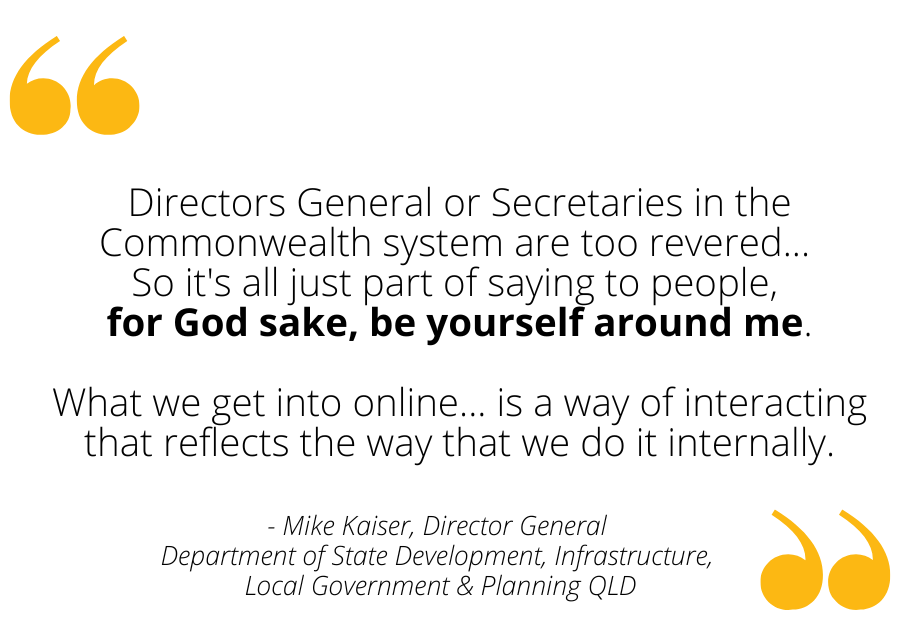
Roger Christie: Again, it sounds so simple, but it’s so effective. We know from the industry data that people are looking – 82% of people are look at CEO’s or leader’s profile online before deciding whether to take a job or not (Brunswick). So if they’re looking at your online profile, they’re looking for not only updates on projects. They’re looking to see: what are your values, what is your character, what is your sense of humour? Is this person the sort of person that I could trust, work with and believe has my back?
So if they do see that playful banter, if they see that fun, if they see that engagement and that recognition, that’s going to speak volumes for whether they do or do not take that job – rather than just seeing updates on the latest projects or, as you were saying before, a very dry description of a job advertisement. I think it’s important that leaders recognise that and harness that opportunity.
TOP TIPS FOR LEADERS ON SOCIAL MEDIA.
Roger Christie: So as a good place to finish, Mike – what would you say to leaders who are sitting on the fence themselves? What steps could they take to get comfortable with just being themselves online?
Mike Kaiser: Firstly I’d say have a crack. Give it a go. Don’t be afraid of it. Don’t pull back from it. You’ll never get anywhere unless you start playing with it and start experimenting with it. Get a feel for what it’s like. Test the reaction that you’re getting. So number one, dive in.
Number two, definitely don’t let anyone do it for you. I sometimes rely on notes from the team if I’m trying to detail something that the department has done. I’ll want to try to get the facts right and so I’ll get a contribution but I always make sure that the posts and the comments are in my own voice. That’s the most important thing. You can’t get someone to write this stuff for you.
Be interesting. There’s a lot of turgid crap online which is not interesting. Try to think what about your organisation or your leadership style might be of interest. I think that takes some thought. You can’t just spew out any old nonsense onto social media and expect to get a reaction to it.
I think another important thing is be conscious of where the line is for you. In every organisation, public or private sector, there will be a line. If you’re a CEO, you’ll have a board to think about.
You’ve got to make it an extension of what you’re bringing to the organisation internally. It can’t and shouldn’t be something different. You can’t maintain a different persona online to the one that you have internally, to the person that you really are.
I’m making it sound like that’s something you have to work at. In fact, if you stop working at it, you’ll find it really natural to do and you’ll stop being concerned about that alignment. It’s not something you have to try to achieve. It’s something you have to prevent from not happening.





HAVE A CRACK.
GIVE IT A GO.
DIVE IN.
DO IT YOURSELF. OWN YOUR VOICE.
BE INTERESTING. THINK OF YOUR AUDIENCE.
BE CONSCIOUS: WHERE IS THE LINE FOR YOU?
BE CONSISTENT: ON AND OFFLINE.
Roger Christie: Just be yourself, is the message I’m hearing loud and clear. It’s not rocket science. Just be yourself.
Mike, I appreciate you sharing your own journey and experience. I personally love unpacking leader’s stories and where it all started, and I’m grateful for the time and advice that you’ve given.
Feel free to drop Roger Christie or Mike Kaiser a note with any thoughts – they’d love to hear from you. If you want more on all things digital reputation, be sure to subscribe to the Your Digital Reputation newsletter packed full of advice, trends and the best leadership examples just for you.

